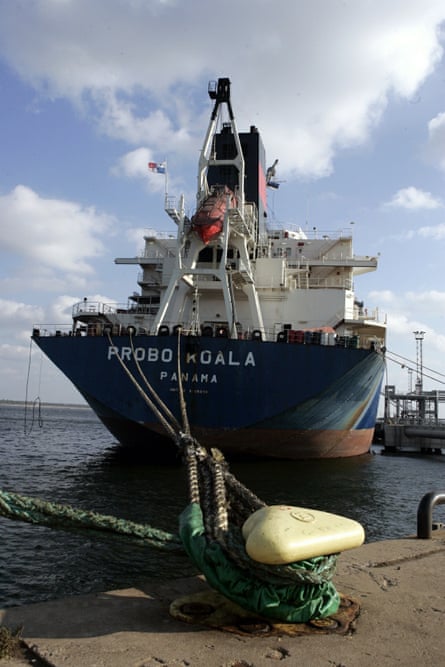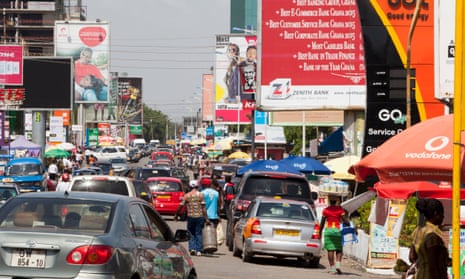Major European oil companies and commodity traders are exploiting weak fuel standards in African countries to export highly polluting fuels that they could never sell at the pumps in Europe, according to a new report.
The Swiss commodity traders Trafigura and Vitol are among a number of companies accused of exporting what campaigners call “African quality” diesel, blending products in European facilities to create fuels with sulphur levels that are sometimes hundreds of times over European limits, according to a three-year research project by the Swiss NGO Public Eye.
When the fuel is burned, the sulphur is released into the atmosphere as sulphur dioxide and other compounds that are major contributors to respiratory diseases such as bronchitis and asthma.
Trafigura made headlines when a ship it had chartered dumped toxic waste in the Ivory Coast a decade ago, and the company’s lawyers attempted to gag the press from reporting on a draft report into the incident.
Vitol’s sales last year topped $270bn. Its chief executive, Ian Taylor, is a major Conservative donor, and this summer refused a knighthood.
Although not part of the report, according to data shared with the Guardian by Public Eye, the British oil company BP also shipped high-sulphur diesel to Ghana.
There is nothing illegal about the practice exposed by the report, and the blending of fuels to achieve particular specifications before export is standard industry practice. The companies involved all deny any wrongdoing and say they comply with the law in the countries in which they operate.
Public Eye, however, says the result is “regulatory arbitrage” that allows traders and fuel companies to dump cheap, dirty fuels by blending them into other diesel before export, maximising profits at the expense of Africans’ health. Erik Solheim, the director of the UN Environment Programme (UNEP) called the practice unacceptable.
Last week, the World Bank said air pollution was among the biggest killers worldwide, costing developing countries billions of dollars in lost income. Vehicle emissions are a significant contributor to air pollution, which is why in Europe the maximum sulphur content of diesel has been set at 10 parts per million (ppm) since 2009.

In parts of Africa, the legal limit on sulphur in diesel is 5,000 ppm, although UNEP has been working to bring this down. The rapid growth of urban dwelling and car ownership in the developing world means that more Africans are exposed to high vehicle emissions.
The high-sulphur fuels also have a knock-on effect, rapidly destroying emission-reducing technologies in vehicles, according to Rob de Jong, the head of the UNEP transport programme. “So if you buy a vehicle that’s a couple of years old and import it into some of the African countries, the technology in there – sensors and filters – all gets spoilt, and these cars, which are potentially very clean, are destroyed in a couple of tanks, and for the next 20 years will be belching smoke,” he said.
“It’s important to understand the tragedy of this,” he said.
This in turn increases emissions of fine particulate matter, which can lodge deep in the lungs, causing cancers and other health problems.
Public Eye tested diesel sold at the pumps of outlets partly owned by various Swiss trading companies in eight countries across sub-Saharan Africa, and found that more than two thirds of the fuel they sampled had sulphur levels of more than 1,500ppm, 150 times the European limit.
Data shared with the Guardian shows that ships chartered by BP imported cargoes tested at more than 3,600 ppm in 2013, when the legal sulphur limit was still 5,000 ppm. In 2014, when the legal limit had been reduced to 3,000 ppm, BP shipments identified in the data registered sulphur content of 2,500 ppm.
Public Eye’s interest in the area was first sparked after the Probo Koala, a tanker chartered by Trafigura, dumped toxic waste in the Ivory Coast in 2006. The company later agreed a settlement with solicitors Leigh Day on behalf of 30,000 claimants affected by the dumping.
“Like everyone else, we focused first on the waste, but then we asked ourselves: Why was Trafigura improvising a refining operation aboard a tanker, which created the toxic waste in the first place?” Andreas Missbach, head of Public Eye’s commodities team, told the Guardian.
“It had been done to produce a blendstock, a very highly sulphurous intermediate product to be blended into the gasoline,” he said. “This high-sulphur gasoline could never have been sold at a pump in Europe, but it was good enough for the African market.”
When contacted by the Guardian, Trafigura, Vitol and BP all pointed out that they comply with the fuel standards imposed by the governments they ship to, and that they support efforts, including those by the African Refiners Association, to improve fuel standards.
A BP spokeswoman said: “BP supplies a wide variety of oil products to markets all over the world based on the demands of our customers, and we ensure that we meet or exceed all legal obligations. BP does not set the requirements for the markets in which we operate, it is up to each country to determine the specification, including levels of sulphur and other parameters that are suitable in their local market.”
A Vitol spokeswoman said Public Eye’s report was “misinformed” and added: “Vitol does not control the supply chain, in which product from various suppliers, including major oil companies, is co-mingled, and Vitol therefore is unable to determine the quality of fuel sold at the pump.” She said that fuel data published by Public Eye did not relate to Vitol cargoes.
Imports are controlled by government authorities, which set fuel limits, invite bids, buy the cheapest fuel that meets those limits and then store all products together for distribution to retail outlets, the spokeswoman explained.

A Trafigura spokesman said: “Trafigura is a leading supplier to a number of markets in sub-Saharan Africa of refined petroleum products that meet national regulatory requirements for fuel, for example by blending materials from different sources. These requirements are imposed by national governments and cannot practically be altered by individual suppliers.”
A spokesman for Puma, the petrol station chain partly owned by Trafigura, said Public Eye’s report had “simplistic and misleading assertions”. He said: “It is simply not possible for individual companies to supply fuel to a higher specification than that imposed by the national regulator, not least because in many of these markets fuel is supplied at uniform quality through a single logistical supply chain.”
De Jong, however, said suppliers deliberately blended products towards the high end of the nationally imposed sulphur limit to increase their profits.
“There’s not much market anymore for high-sulphur fuels. These are really specific batches made for those specific countries,” he said. The report finds that the blending is often carried out at European facilities.
The harm done by high-sulphur fuels is hard to measure, particularly in parts of Africa where data-gathering is poor. There is no doubt, however, that air pollution kills. A report published by the World Bank and the Institute for Health Metrics and Evaluation (IHME) last week found that air pollution is the third-biggest cause of death in poor and lower-middle income countries. It estimated that it killed more than 17,500 people in Ghana alone in 2013, costing more than $542m in lost labour income, an estimate that doesn’t even include the cost of treating pollution-related disease.
Vehicle emissions are a significant factor. “There’s limited data but it’s quite obvious if you look at the roads,” said Dr Carlos Dora of the World Health Organisation. “It’s visible, it’s major and I would have no doubt that it’s one of the main causes of air pollution overall.”
